Climate Governance in Nigeria
Attachments

The CAT Climate Governance series seeks to produce a practical framework for assessing a government’s readiness - both from an institutional and governance point of view - to ratchet up climate policy and implement adequate transformational policies on the ground, to enable the required economy-wide transformation towards a zero emissions society.
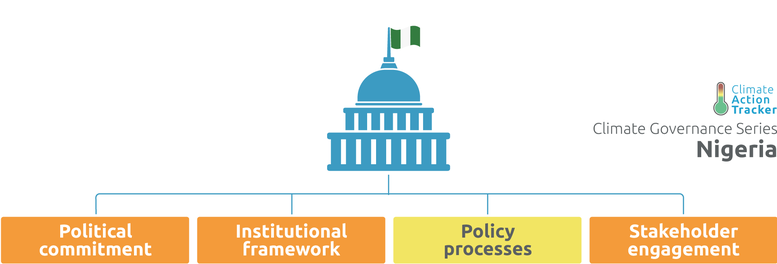
Our methodology
We have set up a framework that assesses and scores a number of indicators, where we rate various aspects of governance. This allows us to establish a common basis on which to compare climate governance across countries as well as identify areas of improvement and highlight positive developments. We have applied this framework at a national level only.
This assessment of Nigeria is based on our 2020 methodology. For more detail on our updated methodology, see here: methodology page.
Assessment of national level readiness
Transiting to a zero emissions society has not been a top priority for Nigeria; however, recent actions by the Buhari administration and the National Assembly indicate that decarbonisation may be moving up on the domestic agenda. In late 2021, Nigeria adopted a net zero target and President Buhari signed the long-awaited Climate Change Bill into law. There is some support from key figures for mitigation actions, like the Vice President’s support of the renewable energy target. Time will tell whether these developments mark a real shift.
Climate change does not play a significant role in party politics in Nigeria, which is typically centered around addressing security, corruption and economic reform. However, there have been no substantive rollbacks in climate policies, and passage of the Climate Change Bill marks a positive shift in Nigeria’s political landscape. Pervasive corruption, particularly in the oil and gas sector, is a risk to the transition and impedes the government’s ability to respond to climate change.
Effective coordination across Nigerian ministries and agencies at all levels of government is currently limited. As a result, climate change is not consistently mainstreamed into policy plans and targets. Meetings of the Inter-Ministerial Committee on Climate Change (ICCC), a key coordinating mechanism established to promote engagement on Nigeria’s climate response across sectors, have been intermittent and ad hoc. The creation of the National Council on Climate Change under the 2021 Climate Change Act is expected to improve coordination.
Nigeria does not have a bespoke entity to provide advice and analysis on transition policies, and existing organisations have done little work in this area. However, the country regularly works with international organisations to support policy development processes, though it is difficult to gauge the extent to which the government considers any advice received.
The government is currently engaging with national and international organisations to develop decarbonisation pathways as it turns its 2050 Long-Term Vision into an implementable strategy.
Capital and resource constraints are a serious impediment for Nigeria. Resource allocation for mitigation measures has not been consistent in recent years. The Department of Climate Change is reliant on external consultants for many tasks, which impedes capacity building and institutional learning over time.
It is unclear how the Climate Change Act will impact Nigeria’s institutional framework; however, implementation of key provisions has the potential to improve governance structures for climate action and achieving Nigeria’s net zero ambitions.
Nigeria’s policy processes have improved with the adoption of the Climate Change Act, though there is still scope for further enhancement. By setting into law a net zero target and establishing a five-year and annual carbon budget process, the Climate Change Act improves on the country’s near- and long-term planning. The government has also adopted its 2050 Long-Term Vision (LTV). The targets contained in the Act and Vision are not aligned, but further work to elaborate on the Vision is planned for 2022. Existing regulations outside the new climate law that address mitigation are fragmented and piecemeal.
There is significant room to improve on Nigeria’s transparency framework. The country lacks a fully operational GHG Inventory System and its ability to track climate finance and mitigation actions is limited. A number of initiatives are underway to address both of these issues. Given that the Climate Change Act provides for a five-year carbon budget cycle, it is assumed this will establish a formalised ratchet up mechanism that ensures its NDC is reviewed and updated; however, it is unclear if this will be in sync with the Paris Agreement’s five-year cycle.
There is significant room to improve the government’s support of public engagement and education. Climate literacy amongst the general public remains low. The new law could help ameliorate the situation as it includes provisions to integrate climate change into the educational curricula.
Nigeria has committed to advancing the just transition and is increasingly incorporating green job considerations into employment and environmental plans. However, concerns over a public backlash in response to fossil fuel subsidy reform only serve to highlight the importance of fair climate policies and the need to build trust in the public that compensatory programmes will be available.
Those at risk from the transition, especially the oil and gas industry, are likely have significant influence over the government, given the long history of corruption in the sector.
Rating system
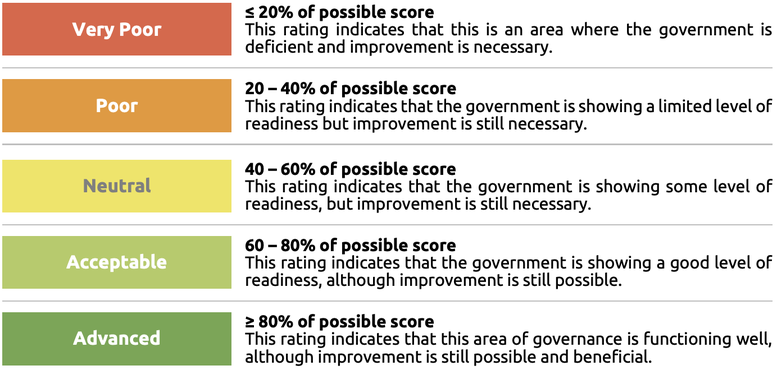
We analyse a number of different criteria of governance under four categories that cover the key enabling factors for effective climate action. We give each a rating as outlined above (very poor - poor - neutral - acceptable - advanced). The methodology framework used for this assessment is here. For more detail on our methodology in general, click the link below.
Ratings and Recommendations
The following section outlines the results of the analysis for each of the different categories and criteria as well as our recommendations for each category of governance.

- Strengthen leadership on the transition to a zero emission society across all sectors, particularly concerning linkages to other national priorities.

- Ensure swift implementation of the institutional framework established under the 2021 Climate Change Act.
- Ensure the National Council on Climate Change meets regularly, rather than on an ad hoc basis as previous institutions have, in order to support effective coordination within government.
- Establish an authoritative institution, or mandate an existing institution to provide advice to the government on transition-related issues.
- Increase staffing and resources of the Department on Climate Change, or ensure adequate resources in the new National Council on Climate Change established under the Climate Change Act, to advance implementation of the climate strategy.
- Provide consistent levels of funding for climate mitigation measures in the Federal Budget.

- Reconcile differences in ambition between the net zero target passed into law under the Climate Change Act and the overall and sectoral targets submitted in Nigeria’s Long-Term Vision to ensure short and medium-term planning is consistent with Nigeria’s long-term goals.
- Ensure climate objectives are mainstreamed into sectoral policies.
- Continue to develop and strengthen the transparency framework, especially tracking and reviewing climate action.
- Ensure adequate resources and expert capacities are available to support recent institutional setups.

- Increase public awareness of climate change and the need for a transition through public outreach and education.
- Continue to build on efforts to ensure a just transition and build trust in the fairness of climate policies.
Nigeria's Climate Governance
These tables from the report give an overview and analysis of the key factors of Nigeria's governance to enable effective climate action. We have looked at the country's key institutions, strategies, targets and legislation.
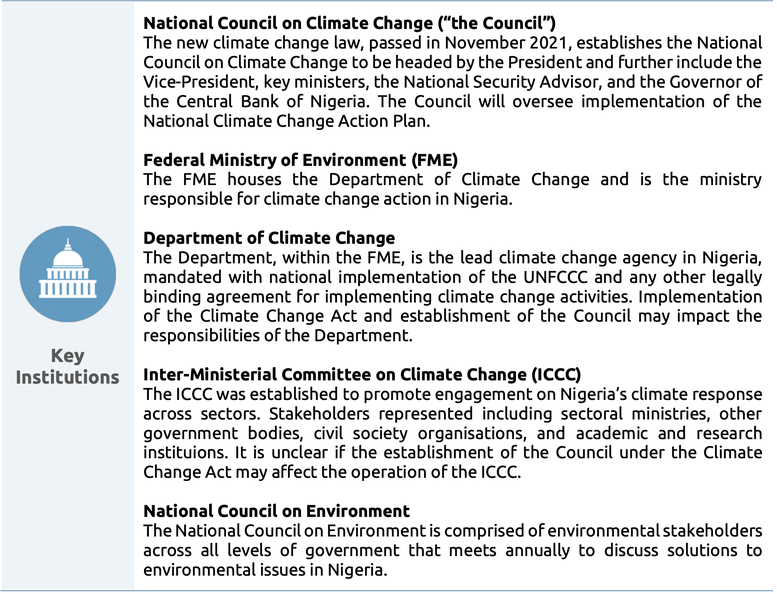
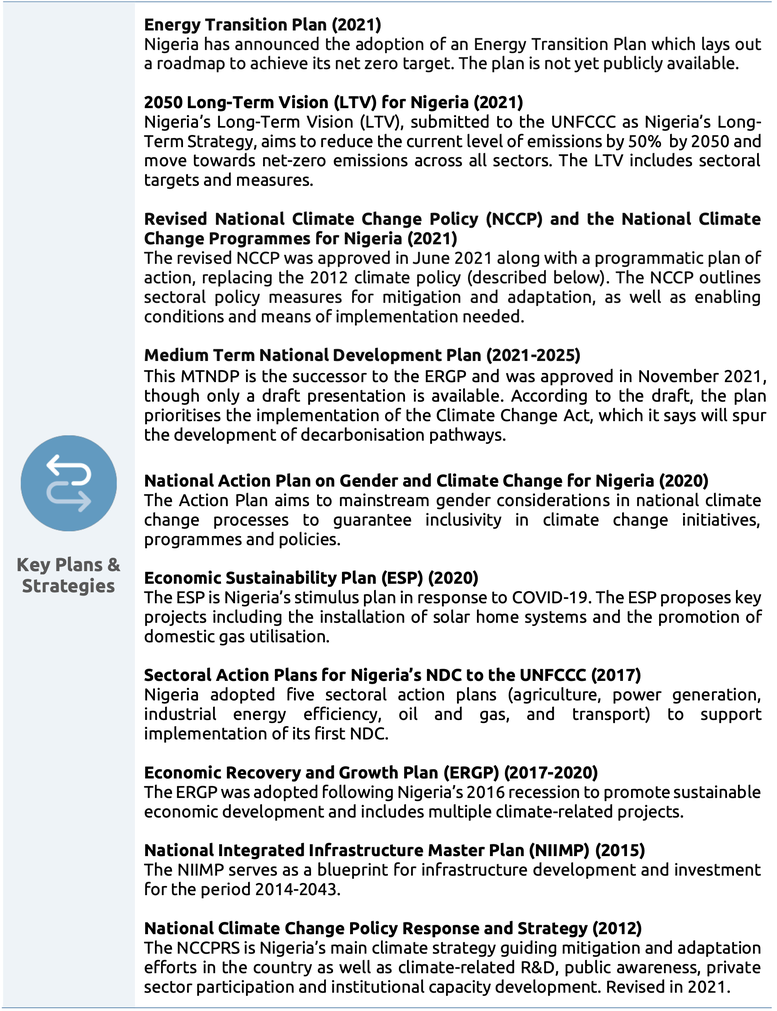
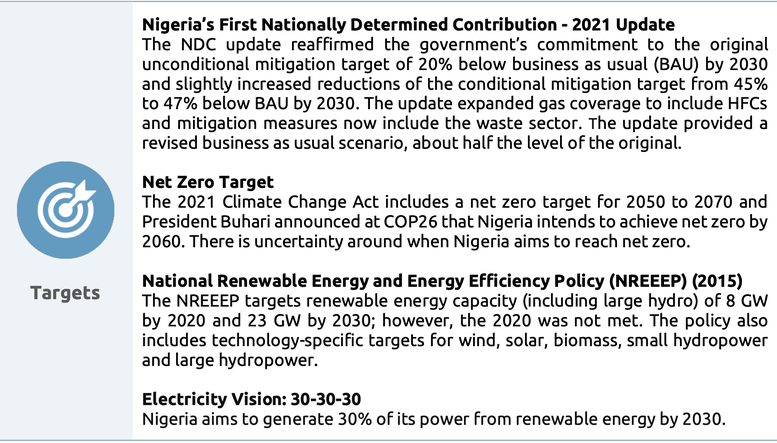
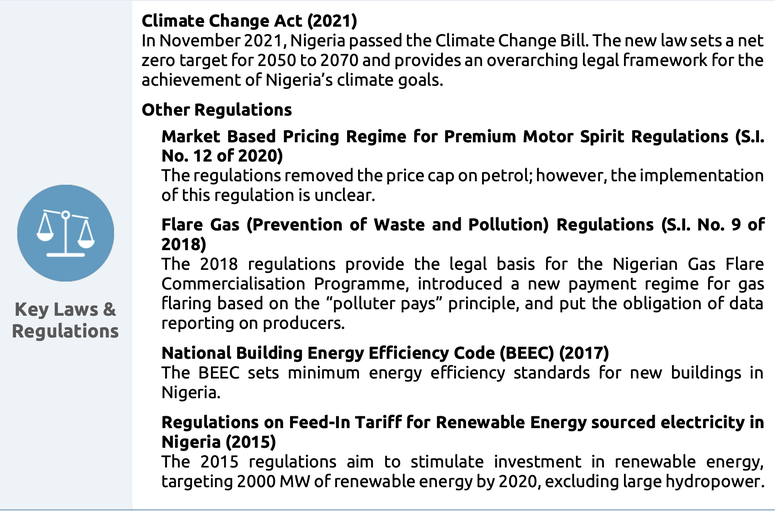
Stay informed
Subscribe to our newsletter